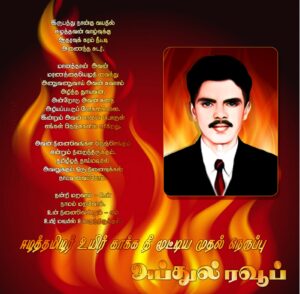

Abdul Rawoof, “The First Flame Kindled to Protect the Lives of Eelam Tamils”

Abdul Rawoof, “The First Flame Kindled to Protect the Lives of Eelam Tamils”
In 1995, the Sinhala nationalist regime of Chandrika Kumaratunga forcibly displaced hundreds of thousands of Eelam Tamils from the Jaffna peninsula through military operations. On one hand, the Sri Lankan cricket team was preparing to play in Tamil Nadu, accepting a red-carpet welcome from the Indian government for the South Asian Cricket Tournament. On the other, TV screens displayed news of 150 Liberation Tigers of Tamil Eelam (LTTE) members killed in a Sri Lankan army attack.
Unable to bear these events, a 24-year-old man was seen in despair. On the morning of December 15, 1995, he went to the computer training center in London where he worked. Entering a room there, he poured kerosene over his body. Clad in soaked clothes, he ran to the nearby Kamarajar Road and set himself on fire. Witnessing his burning body, friends rushed to save him. At that moment, the young man uttered these heart-wrenching words: “Do not save me; save the Eelam Tamils!”
He was admitted to a government hospital with severe burns. Police rushed to take his statement. When asked about his political affiliation, he responded: “Do not tarnish this act by associating it with any political party. I immolated myself entirely for the Eelam Tamils.” These were his final words.
His name was Abdul Rawoof, born on December 5, 1971, to Asan Mohammed, a district leader of the Tamil Nadu Government Employees Union in Perambalur and a supporter of the Dravida Munnetra Kazhagam (DMK). Abdul Rawoof studied only up to the 12th grade and was known for his deep-thinking nature from a young age. He was reserved but always gave clear answers when asked. He was deeply attached to his mother, loved reading books, and once cried inconsolably when India lost a cricket match, displaying his patriotic fervor.
However, the escalating atrocities of the Sinhala regime against the Tamil population deeply disturbed him. Witnessing India’s indifference to these horrors, he became disillusioned and began resenting both the Sri Lankan government and India.

At one point, while attending shorthand training at the Nagapattinam ITI, Abdul Rawoof disappeared unexpectedly. His distressed father, Asan Mohammed, later learned he was in the Colaba area of Mumbai. After much persuasion, Asan Mohammed brought him back to Tamil Nadu. During this time, Abdul Rawoof expressed his anguish, telling his father, “I went to join Prabhakaran’s movement to fight. You have ruined my dream.” His words stunned his father, who realized the depth of his son’s commitment to Eelam liberation.
Even on the brink of death, Abdul Rawoof showed no trace of regret, a fact his father revealed in several interviews. His unwavering dedication to the liberation of Eelam and his admiration for the LTTE were later commended by the French office of the LTTE in a statement:
“Abdul Rawoof’s sacrifice demonstrates that all those who silently spread poison in the air we breathe will one day be reduced to ashes. The torch he lit is still burning—it will consume enemies, end hostility, and lead to victory for Tamil Eelam.”
Abdul Rawoof’s torch remains unextinguished. It burns on, igniting resistance and paving the path for Tamil Eelam’s triumph.
News help: Nanthan, Vazhi maathamirumurai edu ( December 1-15, 1997)